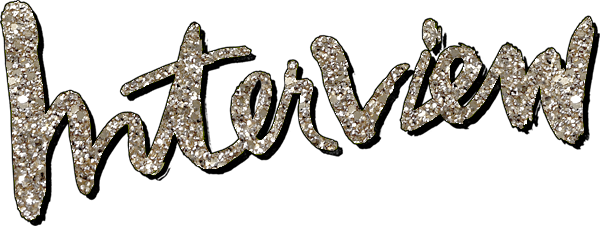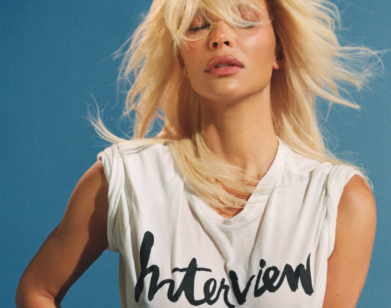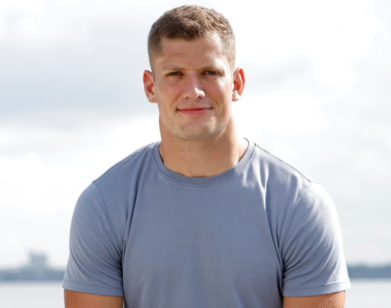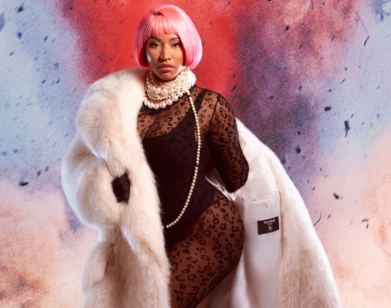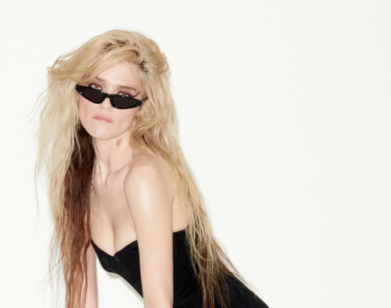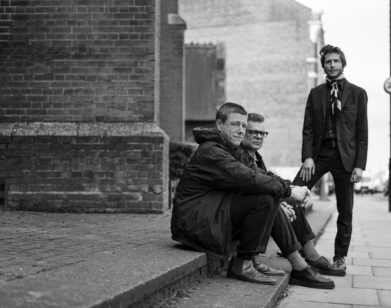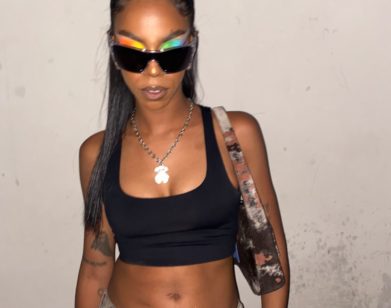“If Drake and India Arie Had a Baby, It Would Be Kehlani.” Lena Waithe Interviews the R&B Renegade
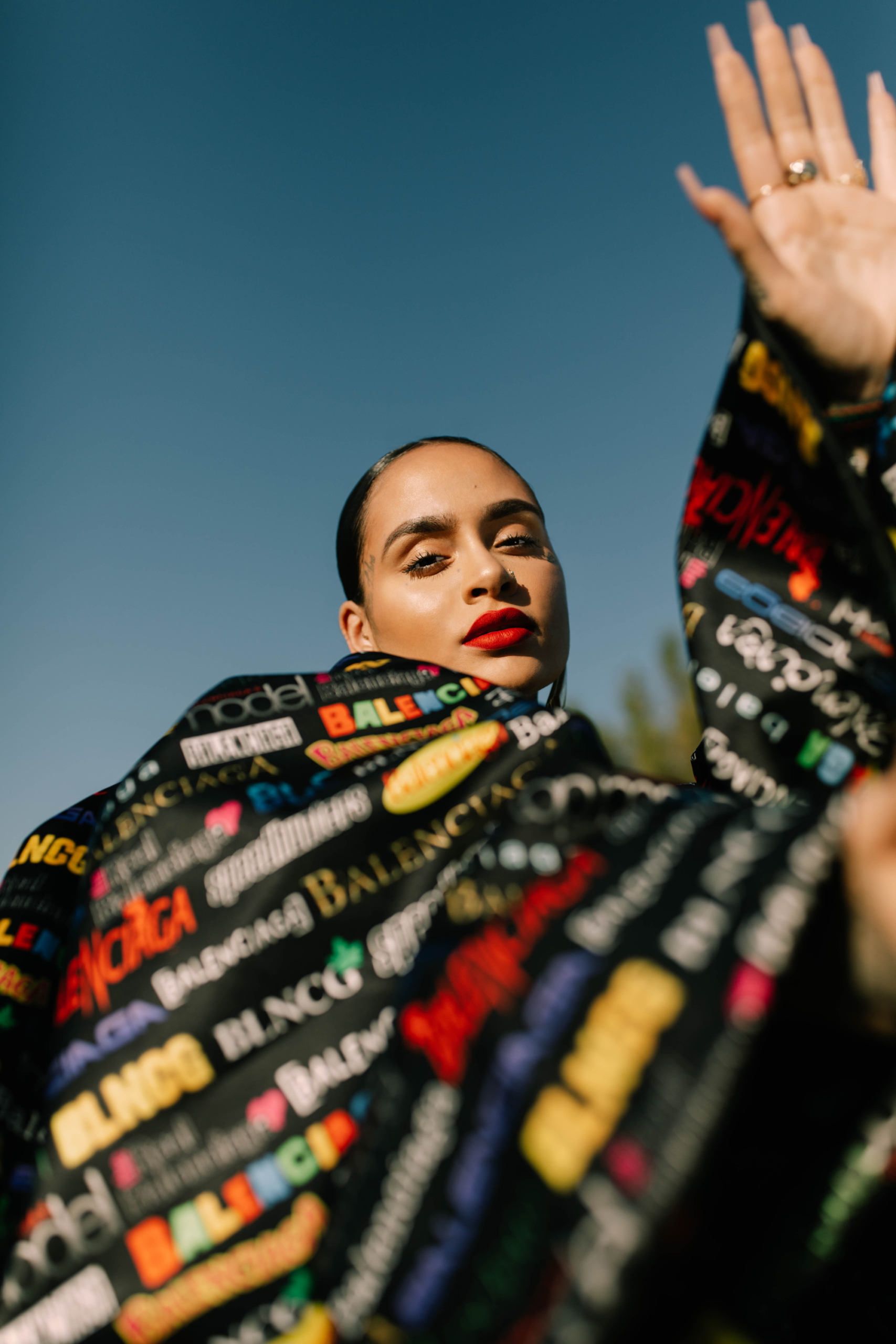
Dress by Balenciaga. Rings Kehlani’s own.
When the pandemic hit, Kehlani was faced with a big decision: Would she proceed with the scheduled release of her new album, It Was Good Until It Wasn’t, on April 24, or would she postpone the album to a date more befitting a major-label drop? Despite pushback from executives with an eye toward the bottom line, the 25-year-old singer, whose full name is Kehlani Parrish, chose not to wait, coming out with her new music on May 8, two weeks after its scheduled release. By then, the Oakland native had already released two homemade videos in quarantine—for her singles “Toxic” and “Everybody Business”—that stood as testaments to a defiant streak that’s endeared her to fans since she released her first mixtape, Cloud 19, back in 2014. In the years since, Kehlani has made defiance a big part of her identity, whether it’s coating savage clapbacks in sinewy R&B, or battling the gossip blogs by setting the record straight in her songs—on her terms. On It Was Good Until It Wasn’t, Kehlani embraces the radical honesty her audience has come to expect, using her pristine vocals to lay waste to toxic relationships (much of the album is believed to be centered on her ill-fated relationship with the rapper YG). It’s that toxic love—and why we’re drawn to it—that the writer, actor, and producer Lena Waithe wanted to discuss when she connected with Kehlani earlier this month. —BEN BARNA
———
LENA WAITHE: What’s up Kehlani, how are you?
KEHLANI: I’m frazzled, but I’m good.
WAITHE: Don’t be frazzled. It’s all good. I really, really fuck with what you’re doing. The sound on your new album feels very throwback, but still very new. “Toxic” is such a great intro to what I believe this album is about, which is toxic love. That seems to be everybody’s favorite kind of love. Whether it be toxic romance, toxic friendships, toxic relationships with your family. A lot of people have more toxic relationships than healthy ones. So my question to you is, why are we so drawn to toxicity in our lives?
KEHLANI: Maybe it’s about what we think we deserve. There are two different kinds of toxic relationships. One’s toxic and you’re just fucking with it because you’re still down with it. And then there’s the other kind, like, you actually have no idea until something happens, and then you look at the whole thing like, “Oh, damn. This might be bad.” Toxic shit can be very fun. That’s partly why it’s so toxic.
WAITHE: Do you like singing about being happy and in love, or is it more fun to sing about being unhappy in love?
KEHLANI: If you listen to a lot of my older music, I had a lot of joyfully-in-love type of music, and it’s definitely easy to make that. But I’ve come to this realization that people tend to lean on music more when they’re in sadder situations, or lonely situations, or frustrated situations. And when they want to do happy stuff, it isn’t what old happy music was, where it was literally talking about being happy. It tends to be turned-up shit.
WAITHE: Do you really “Hate the Club”?
KEHLANI: I hate the theme of that song, which is that you know you’re going to spend the entire night with hella anxiety because the person that you don’t want to be there is definitely there. Other than that I fuck with the club. I also love little weird bars.
WAITHE: “F&MU” is also a really dope song, which stands for “fuck and make up.” Can you talk about the process of making that song?
KEHLANI: I was writing with my homegirl who’s one of my favorite people to work with. We were just sitting in a studio and I said, “I want to be able to talk about sex, but very specific kinds of sex.” Make-up sex, as treacherous as it can be, becomes this fun and playful thing versus this really intense thing. To me the song feels playful.
WAITHE: It’s tough when you’re in the public eye. You can be an artist or a celebrity, and sometimes you have to exist as both. How does that affect the content of the music? Do you worry that whenever you come out with songs, people are wondering if it’s about what’s going on with your own personal life?
KEHLANI: It’s been a back-and-forth thing, because sometimes I know something’s about to get messed up or someone’s going to let the public know something crazy. If I know that I’m breaking up with somebody, I might just make a song about it to be able to say what I want to say in the best way I can say it, which for me is music. Other times, I’ve just been frustrated and I’ve gone to the studio and made something and put it out that night. But I kind of trained people to have this relationship with my music where they really believe every single thing that comes out has a direct relation to what’s going on.
WAITHE: What’s great with your music is that people can see an evolution, not just in terms of you as an artist, but in terms of your life. What changes have you seen in yourself as an artist?
KEHLANI: I used to be overly inspirational, and I don’t say that as a bad thing, but that was something I strived to do in the studio all the time, to be very purposeful in every song: message, message, message. My views kind of got lost because being in love with the art itself went away. When you have to focus on putting something out that’s so intentional every time, you almost lose the pure intentions that come through when you’re just creating. I think I’ve grown in the way that I’ve let my emotional self take over as the writer, just writing more freely. That’s the biggest growth for me. My lyrics are a complete 180 from what they used to be in terms of maturity. And I have a kid, so that changes everything.
WAITHE: The music game is super crowded. I’m a ’90s baby, so I remember there were only so many artists that were really hot. It was Toni Braxton. It was Whitney Houston. Then you had TLC, you had Brandy, you had Monica. But now, there are so many artists out there. I think the music business is a more difficult space to navigate now, because of streaming services, people dropping stuff on SoundCloud. There’s always a new person that everybody’s talking about. But you seem to remain a constant. I know your road has been a little rocky, but people are loyal. You’re a part of the culture. What do you think it is about you that keeps them loyal?
KEHLANI: I’ve just been really honest, and people got the opportunity to grow up with me. A lot of my fanbase is around my age, so they’re growing up with me and building this connection outside of just my music. They love my daughter. They love a lot of my friends. They’re fans of my family members.
WAITHE: As a television writer, I’m cool with the other Black television writers, the Black filmmakers. It’s a bit of a tribe. Do you feel like you have a tribe in the music industry?
KEHLANI: I have a couple of people I would consider best friends in the industry. A girl named Ambré, I love Ella Mai, I love Jean Deaux, I love Yung Baby Tate. I connect with artists who are grateful for where they are today. We’re the artists who end up sitting in a room and having a conversation about how none of the stuff in the fog matters. The people who will be blessed to get nominated for something but aren’t tripping otherwise. The people who are just in this to retire their moms to feed their families. You would think a lot more people would be like that, but you end up in these conversations with people who are like, “Yo, if I don’t win 15 Grammys, fuck everything. Nothing matters. I’m officially not good.” Or, “If I don’t have five Lambos by the time I’m 25, I quit.” It’s exhausting.
WAITHE: Do you let your friends or people you trust listen to the music and give feedback? Big Sean played some stuff for me and he was looking at me like, “Do you have thoughts?” I didn’t know what to say. What does one say?
KEHLANI: My favorite person that I had been running everything by doesn’t even make music, but he is a genius. It’s Kerby [Jean-Raymond] from Pyer Moss.
WAITHE: That’s my guy.
KEHLANI: I know, that’s why I said it, because I know you fuck with him. He was in the studio all the time. Every time I finished a song, I ran it by him. Before quarantine, before I had to make everything myself, he was actually going to be creative directing.
WAITHE: Artists get a lot of pressure from people to put out new music. Back in the day, you got music when you got it. We didn’t have access to artists. An artist would go away for eight years and then drop an album. Now, people have short attention spans. They’ll listen to your album, bang it for like a week and a half, and then be like, “What’s next?” Are you going to let this album breathe for a while?
KEHLANI: I took a long break when I was pregnant. But the other side of the coin is that I’m in a record deal. And I can say, love my label. But at some point, I’d like to be the biggest, best businesswoman I can be, and I’d like to get out of my record deal. Not to wreck anything, I’m definitely going to make a bunch of albums, but I’d like at some point to show my daughter that I can own my own music, because that’s a goal of mine.
WAITHE: You look at Prince’s catalog, he’s got music for days. Musicians make music. But I’m so happy to hear that that’s where artists are moving, particularly artists of color, in terms of ownership. The Dream talks about that all the time: owning, owning, owning. That’s how we build wealth in our communities, by owning our intellectual property rather than selling it.
KEHLANI: I agree.
WAITHE: Who are some of your influences on this particular album? Who were you listening to? Kanye said when he was making The College Dropout that he was listening to The Miseducation of Lauryn Hill. At first, I was like, “What do those two have to do with each other?” But now that I think about it, I think he wanted to make an album that would be as lasting as that. Were you doing a similar thing where you were trying to listen to certain artists to get you in the zone?
KEHLANI: Vocally, I’m always listening to Brandy. As a writer, I’m always listening to India Arie and Drake.
WAITHE: I can’t think of two better artists. If Drake and India Arie had a baby, it would be Kehlani.
